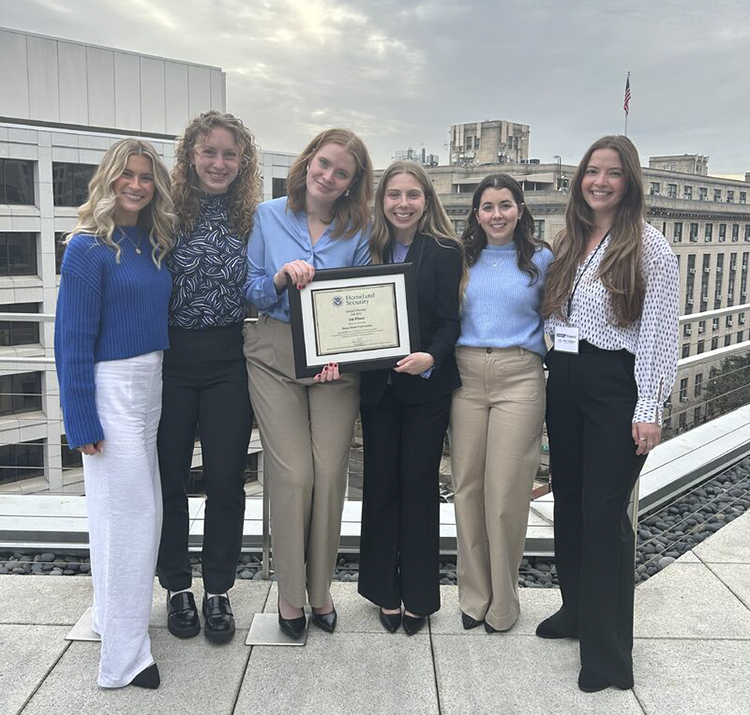Article by Grace Parrott, Catt Center public relations/event planning intern
Invent2Prevent, a campaign created by the U.S Department of Homeland Security to prevent targeted violence, held its sixth nationwide competition last semester that culminated in presentations by the finalists in Washington, D.C. on Jan. 24 – including a team of students from Iowa State University that included Catt Center intern Allie Crowson.

Since the launch of Invent2Prevent in 2021, more than 1,100 high school and college students have participated, with more than 119 colleges participating each year. According to the Department of Homeland Security, each team selects a form of targeted violence, ranging from cyberbullying to campus safety, and creates a program or tool they believe would alleviate this threat on their campus. Last fall, Iowa State’s team was not only selected as a finalist, but their concept ended up winning first overall in the college division.
The team’s involvement in the competition began in Erin Wilgenbusch’s Public Relations 424: Public Relations Campaigns course. A team of 15 students was given the challenge of coming up with a solution for preventing targeted violence on Iowa State’s campus. After researching the issue, the team concluded that mental health is a defining factor in whether or not people commit targeted violence.
“We had to be careful about what narrative we pushed,” said Crowson, a senior in public relations with minors in sociology and political science. “Isolation and alienation can cause people to turn to targeted violence, so our goal was to create a connected community to destigmatize mental health.”
The team came upon the idea of a wellness room, which they named MIND SPACE, where students can enjoy privacy, calm and support.
“The physical manifestation of the entire idea was the wellness room,” Crowson said. “We filled it with plants, coloring books, snacks and resources from the Iowa State University Police Department.”
The room, located on the second floor of Hamilton Hall, is completely anonymous. If a student is feeling overwhelmed they can simply go to the room, switch the sign outside to notify people that the room is in use, and then utilize the resources in the room. Because of the goal of preserving anonymity, there is no reservation process. However, the team needed to prove the success of the project, so they requested that occupants of the room move a rock from one jar to another so the team could track the numbers.
To gain publicity for the project, the team hosted a kindness rock painting night at Hamilton Hall. Participants painted rocks with kind or inspirational words and left the rocks in places around campus where people might see them. Team members also sat in various busy locations around campus, such as the Memorial Union, to ask students to sign a pledge to destigmatize mental health, which garnered over 400 signatures.
A pivotal member of the team, Crowson was one of five team members who traveled to Washington to present the project to the judges, a panel of violence prevention experts. The other presenters were Kathleen Hepworth, a junior in public relations; Jessica Mouw, a fall 2023 graduate in public relations and psychology; and Rachel Gantt and Harper Snead, both seniors in public relations and communication studies. Wilgenbusch also accompanied the group.
One aspect that made the project so unique and successful was how easy it is to adapt in various situations across the country, which is what the Jed Foundation, a mental health focused foundation, recognized in the project.
“Our idea for MIND SPACE was actually picked up by the Jed Foundation. So that was when I knew it was a success,” Crowson said.
For Crowson, the most impactful part of the entire experience was the presentation in Washington, D.C.
“This was a wonderful opportunity for me to travel to the capital, network with professionals in my desired field, and present something I’m passionate about with some of the brightest minds at Iowa State,” she said. “The thing I loved the most about our project is that it taught me that I really can do something meaningful with my career, similar to what I’ve begun to realize through my work at the Catt Center, too.”